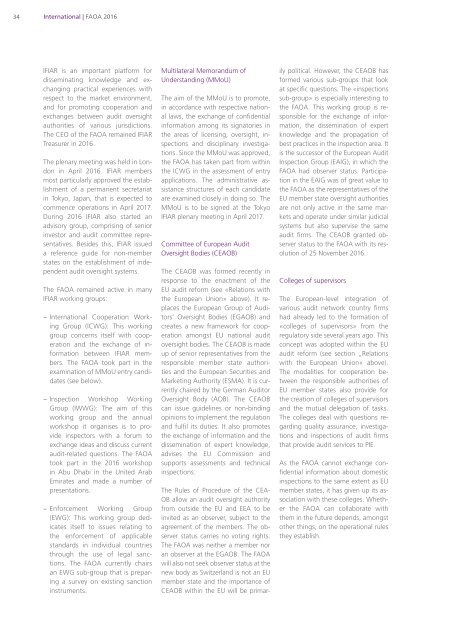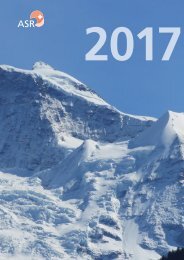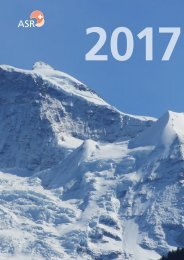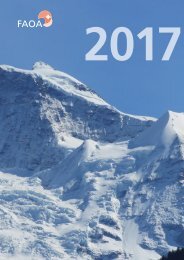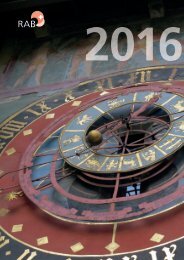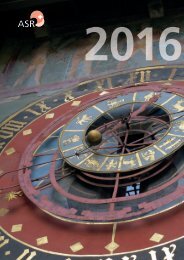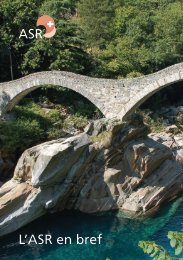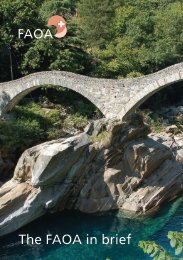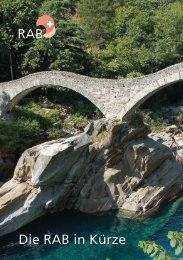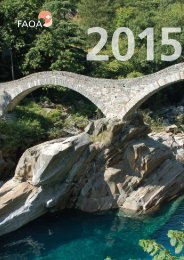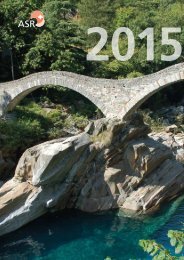Annual Report 2016
Annual Report 2016 - Federal Audit Oversight Authority FAOA
Annual Report 2016 - Federal Audit Oversight Authority FAOA
- No tags were found...
You also want an ePaper? Increase the reach of your titles
YUMPU automatically turns print PDFs into web optimized ePapers that Google loves.
34<br />
International | FAOA <strong>2016</strong><br />
IFIAR is an important platform for<br />
disseminating knowledge and exchanging<br />
practical experiences with<br />
respect to the market environment,<br />
and for promoting cooperation and<br />
exchanges between audit oversight<br />
authorities of various jurisdictions.<br />
The CEO of the FAOA remained IFIAR<br />
Treasurer in <strong>2016</strong>.<br />
The plenary meeting was held in London<br />
in April <strong>2016</strong>. IFIAR members<br />
most particularly approved the establishment<br />
of a permanent secretariat<br />
in Tokyo, Japan, that is expected to<br />
commence operations in April 2017.<br />
During <strong>2016</strong> IFIAR also started an<br />
advisory group, comprising of senior<br />
investor and audit committee representatives.<br />
Besides this, IFIAR issued<br />
a reference guide for non-member<br />
states on the establishment of independent<br />
audit oversight systems.<br />
The FAOA remained active in many<br />
IFIAR working groups:<br />
− International Cooperation Working<br />
Group (ICWG): This working<br />
group concerns itself with cooperation<br />
and the exchange of information<br />
between IFIAR members.<br />
The FAOA took part in the<br />
examination of MMoU entry candidates<br />
(see below).<br />
− Inspection Workshop Working<br />
Group (IWWG): The aim of this<br />
working group and the annual<br />
workshop it organises is to provide<br />
inspectors with a forum to<br />
exchange ideas and discuss current<br />
audit-related questions. The FAOA<br />
took part in the <strong>2016</strong> workshop<br />
in Abu Dhabi in the United Arab<br />
Emirates and made a number of<br />
presentations.<br />
− Enforcement Working Group<br />
(EWG): This working group dedicates<br />
itself to issues relating to<br />
the enforcement of applicable<br />
standards in individual countries<br />
through the use of legal sanctions.<br />
The FAOA currently chairs<br />
an EWG sub-group that is preparing<br />
a survey on existing sanction<br />
instruments.<br />
Multilateral Memorandum of<br />
Understanding (MMoU)<br />
The aim of the MMoU is to promote,<br />
in accordance with respective national<br />
laws, the exchange of confidential<br />
information among its signatories in<br />
the areas of licensing, oversight, inspections<br />
and disciplinary investigations.<br />
Since the MMoU was approved,<br />
the FAOA has taken part from within<br />
the ICWG in the assessment of entry<br />
applications. The administrative assistance<br />
structures of each candidate<br />
are examined closely in doing so. The<br />
MMoU is to be signed at the Tokyo<br />
IFIAR plenary meeting in April 2017.<br />
Committee of European Audit<br />
Oversight Bodies (CEAOB)<br />
The CEAOB was formed recently in<br />
response to the enactment of the<br />
EU audit reform (see «Relations with<br />
the European Union» above). It replaces<br />
the European Group of Auditors’<br />
Oversight Bodies (EGAOB) and<br />
creates a new framework for cooperation<br />
amongst EU national audit<br />
oversight bodies. The CEAOB is made<br />
up of senior representatives from the<br />
responsible member state authorities<br />
and the European Securities and<br />
Marketing Authority (ESMA). It is currently<br />
chaired by the German Auditor<br />
Oversight Body (AOB). The CEAOB<br />
can issue guidelines or non-binding<br />
opinions to implement the regulation<br />
and fulfil its duties. It also promotes<br />
the exchange of information and the<br />
dissemination of expert knowledge,<br />
advises the EU Commission and<br />
supports assessments and technical<br />
inspections.<br />
The Rules of Procedure of the CEA-<br />
OB allow an audit oversight authority<br />
from outside the EU and EEA to be<br />
invited as an observer, subject to the<br />
agreement of the members. The observer<br />
status carries no voting rights.<br />
The FAOA was neither a member nor<br />
an observer at the EGAOB. The FAOA<br />
will also not seek observer status at the<br />
new body as Switzerland is not an EU<br />
member state and the importance of<br />
CEAOB within the EU will be primarily<br />
political. However, the CEAOB has<br />
formed various sub-groups that look<br />
at specific questions. The «inspections<br />
sub-group» is especially interesting to<br />
the FAOA. This working group is responsible<br />
for the exchange of information,<br />
the dissemination of expert<br />
knowledge and the propagation of<br />
best practices in the inspection area. It<br />
is the successor of the European Audit<br />
Inspection Group (EAIG), in which the<br />
FAOA had observer status. Participation<br />
in the EAIG was of great value to<br />
the FAOA as the representatives of the<br />
EU member state oversight authorities<br />
are not only active in the same markets<br />
and operate under similar judicial<br />
systems but also supervise the same<br />
audit firms. The CEAOB granted observer<br />
status to the FAOA with its resolution<br />
of 25 November <strong>2016</strong>.<br />
Colleges of supervisors<br />
The European-level integration of<br />
various audit network country firms<br />
had already led to the formation of<br />
«colleges of supervisors» from the<br />
regulatory side several years ago. This<br />
concept was adopted within the EU<br />
audit reform (see section „Relations<br />
with the European Union« above).<br />
The modalities for cooperation between<br />
the responsible authorities of<br />
EU member states also provide for<br />
the creation of colleges of supervisors<br />
and the mutual delegation of tasks.<br />
The colleges deal with questions regarding<br />
quality assurance, investigations<br />
and inspections of audit firms<br />
that provide audit services to PIE.<br />
As the FAOA cannot exchange confidential<br />
information about domestic<br />
inspections to the same extent as EU<br />
member states, it has given up its association<br />
with these colleges. Whether<br />
the FAOA can collaborate with<br />
them in the future depends, amongst<br />
other things, on the operational rules<br />
they establish.


